You are responsible for the liturgical aspects of the elective Congress. What role does prayer play in the election of the Prelate of Opus Dei?
The liturgy is at the heart of the Church's life, and therefore in the Prelature as well. It will be central to the elective Congress, which begins with a Eucharistic celebration, the votive Mass of the Holy Spirit that will open our hearts.
Each day we will have long moments of silent prayer together and we will set aside a lot of time for personal recollection. We will let Scripture teach us, especially this week with the Letter to the Hebrews and the Psalms, which unify our hopes, and the parables of the kingdom, which remind us that the most important thing is what God does.
Moreover, the Holy See set January 24th as the day the Prelature celebrates Our Lady of Peace, title of the prelatic Church, which is in some way the "cathedra" of the Prelature. The coincidence is providential, for we will carry out our work under the loving gaze of our Lady.
The election of a new Prelate is then ratified by the Pope. In what sense is this important for Opus Dei? Or is it just a formal procedure?
This formal requirement is fundamental and it is filled with meaning. The Pope freely names the diocesan bishops. Opus Dei belongs to the ordinary organization of the Church, which is why Pope Francis names the Prelate. So we're talking about something essential.
The Church has various processes, but the final decision belongs to the Pope. He is our common father, and the visible principle and foundation of the Church's unity, for which we are praying in a special way this week, in union with him. And all the Christian martyrs will be interceding for this unity.
How is this a turning point for Opus Dei? What are the upcoming challenges?
I see it rather as a new phase than a turning point. The future Prelate will certainly not have lived as close to the Founder as his predecessors, but the directives of the Church and the writings of Saint Josemaria clearly delineate the charism and mission of the Prelature.
He is asked to be a good father, to help us sense God's loving fatherhood and to assist the faithful in incarnating the spirit of Opus Dei in today's world. He will have light from the Holy Spirit, uncreated Love who vivifies and renews all things.
Opus Dei was born and grows within the Church, especially in the Eucharist and in prayer: letting God work. Therefore the challenge for the Prelate and for everyone in Opus Dei is to foster a humble fidelity that is intelligent and generous, filled with faith.
The charism of Saint Josemaria is a spirituality for daily life. Why is that necessary today?
Everything that Saint Josemaria transmits comes from the Gospel. In first place, trust in God's loving fatherhood, in his loving providence that is demanding as well. This is very important today, when it is so evident that we need a greater appreciation for fatherhood.
The focus then is on loving the world as the place where we can encounter God and serve others, in professional work and in daily activities, living to the full our divine filiation.
This spirit is attractive for many people, as an answer to longings that are sometimes not fully formulated: discovering in the prose of the world the wonderful heroic poem that we are called to write with God's help!
The poem of a life filled with the hope of heaven and happiness here below. A poem that makes the Cross and Resurrection a reality in the life of a computer engineer, a lawyer, someone who is unemployed, a government official or the chef at a restaurant.
Opus Dei is seen as being active in the communication field. In a spiritual sense, what do you see as the main challenges in this area?
The faith is itself a message, a message of salvation. It proclaims a truth that is first and foremost a Person, Jesus Christ. The Annunciation to Mary is the first communication of the Gospel. Rather than structures of communication, the important thing is the authenticity of each Christian, that each one seeks to be a bearer of Christ to others.
Communication of the Christian message entails love for the truth and personal freedom, with the certainty that God loves and calls each person, as someone unrepeatable in this world. A specific challenge? Not watering down the Gospel, not sacrificing the truth to freedom, nor freedom to truth. The truest freedom is that of loving, that of giving oneself.
Showing others that the truth is both lovable and brings freedom in its wake seems to me a fundamental challenge.
The joy of Christian life and the love that marked the first Christians ("see how they love one another!") are what can truly enthuse others. It's all about letting our heart be moved by a "passion" for God.
